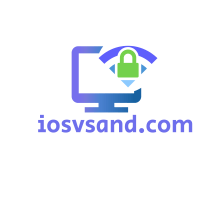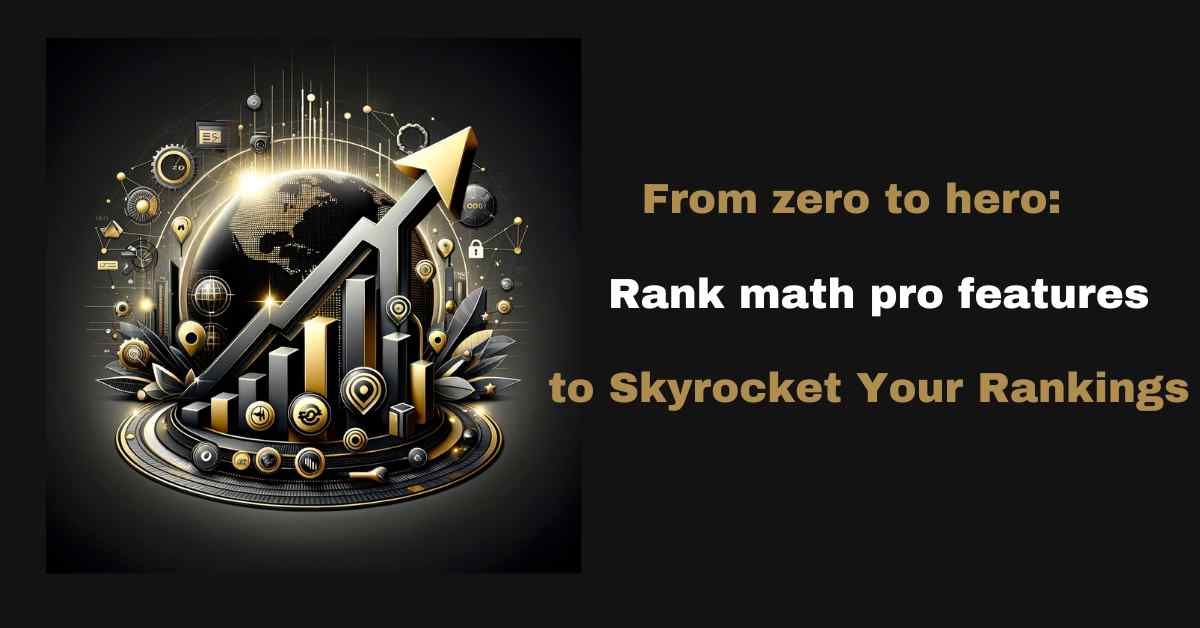Imagine this: your site's protected 24/7 by a team that knows WordPress security inside out.…

Easy blogging for beginners guide (How to start blog in 2024)
Last updated on February 3rd, 2024 at 09:10 pm
- How to start a blog in 2023-
- What blogging means
- How did I start blogging with no experience?
- What tools do you need to start a blog?
- How to start a blog in WordPress
- How to set up your WordPress blog at cloudways web hosting-
- How many types of blogging are there?
- What are some advantages and disadvantages of blogging?
- What are the benefits of blogging?
- What are the disadvantages of blogging?
- What are the top mistakes bloggers make? And How to make your blog stand out?
- How do you motivate yourself for blogging when you are feeling demotivated?
- Can I do blogging for free, or does it cost money to start a blog?
- Disadvantages of free blogging platforms-
- How to Create a Content Strategy
- Tips for creating your first blog post
- How to Get More Traffic to Your Blog
- How to make money by blogging
- FAQ about blogging
- How much does it cost to start a blog?
- How can a beginner start blogging?
- Which blogging platform is best for writers?
- What is a blog, and how does it work?
- Can anyone write a blog?
- How you can start a Blog?
- How to start a blog free?
- Is Blogging Still Profitable?
- What is the difference between Blogging vs Vlogging
- What is the difference between a vlogger and a blogger?
- Why blogging is important for business?
- How to Start a Blog in 7 Steps-
- Do bloggers make money?
- Which blogging platform is best for making money?
- What are templates in blogging?
- How to make a blogging successful?
- How do I optimize my blog for search engines (SEO)?
- Why do most bloggers fail?
- Conclusion:
How to start a blog in 2023-
Are you new to blogging? Do you want to start a blog but don’t know where to begin?
This ultimate guide is for you if you’re unsure what to write about, how to create a website, or where to get traffic.
This guide will teach you everything you need to know about how to start a blog and make money.
You’ll be able to start your own blog and make money from it!
What blogging means
What is blogging, you ask? It’s simply a way for individuals to share their thoughts and ideas with the world by writing about them on a website. Whether it’s about life experiences, musings on current events, or recounting funny stories, bloggers offer readers an inside look at their lives and thoughts. Blogging is a method of publishing written works on the internet. The text can be an article, a diary, or a personal reflection. Blogging is often used to share information and experiences and to build relationships with readers.
Blogging is all about taking your thoughts and turning them into blog posts, which you then share online. This can be done in several ways: on a personal website, on a social media site like Twitter or Facebook, or even on a dedicated blog platform like WordPress.
A dedicated blog platform like WordPress makes it easy to create a professional-looking blog with all the features you need. Not only that, but they offer helpful tools and resources so you can get the most out of your blog. If you’re serious about improving your blogging skills, using a dedicated platform is the way to go.
People might choose to blog for many reasons, from wanting to become more self-published and share their work with a broader audience to developing their writing skills and cultivating an online audience. And because blogs are generally easy to write and publish, they’ve become popular among people of all ages and backgrounds. So what are you waiting for? Start blogging today!
This blogging guide will help you get started as a blogger, from finding an idea for your blog to developing a strategy for promoting it. It will tell you how blogging is done effectively by beginners. Here you will learn how to start a successful blog and make money.
How did I start blogging with no experience?
I used to learn online and watch many YouTube videos on the topic “how to make money online,” From that, I learned about blogging. I then started reading other blogs on blogging to learn more. I soon realized it is a great way to make money online and decided to start my blog.
Ever since I started blogging, I have been quite passionate about it. I have been publishing articles on different free and paid platforms for the past few years. I soon realized that there are many restrictions on these free blogging platforms, limiting what you can do with your blog. However, as the years passed, I realized that blogging was not as easy as it seemed. I made so many mistakes and failed so many times. I have learned a lot from my mistakes, and I am grateful to have had the opportunity to do so. This blog is my first successful attempt, and I am delighted with it.
I chose a topic that I was interested in and started writing articles. I researched keywords and included them in my articles to help me rank higher in search engines. I also made sure to include links to my blog posts in my social media profiles and share them with my friends and family.
Within a few months, my blog was starting to get some traffic. I continued writing high-quality articles and optimizing my blog for search engines. My blog continued to grow, and now it’s one of the top results for some of the keywords I targeted. So, this is how I started blogging.
What tools do you need to start a blog?
Starting a blog is a great way to share your opinion and connect with like-minded people, but it can be hard to know where to start. To get started, you’ll need the right tools. Here are five of the essential tools:
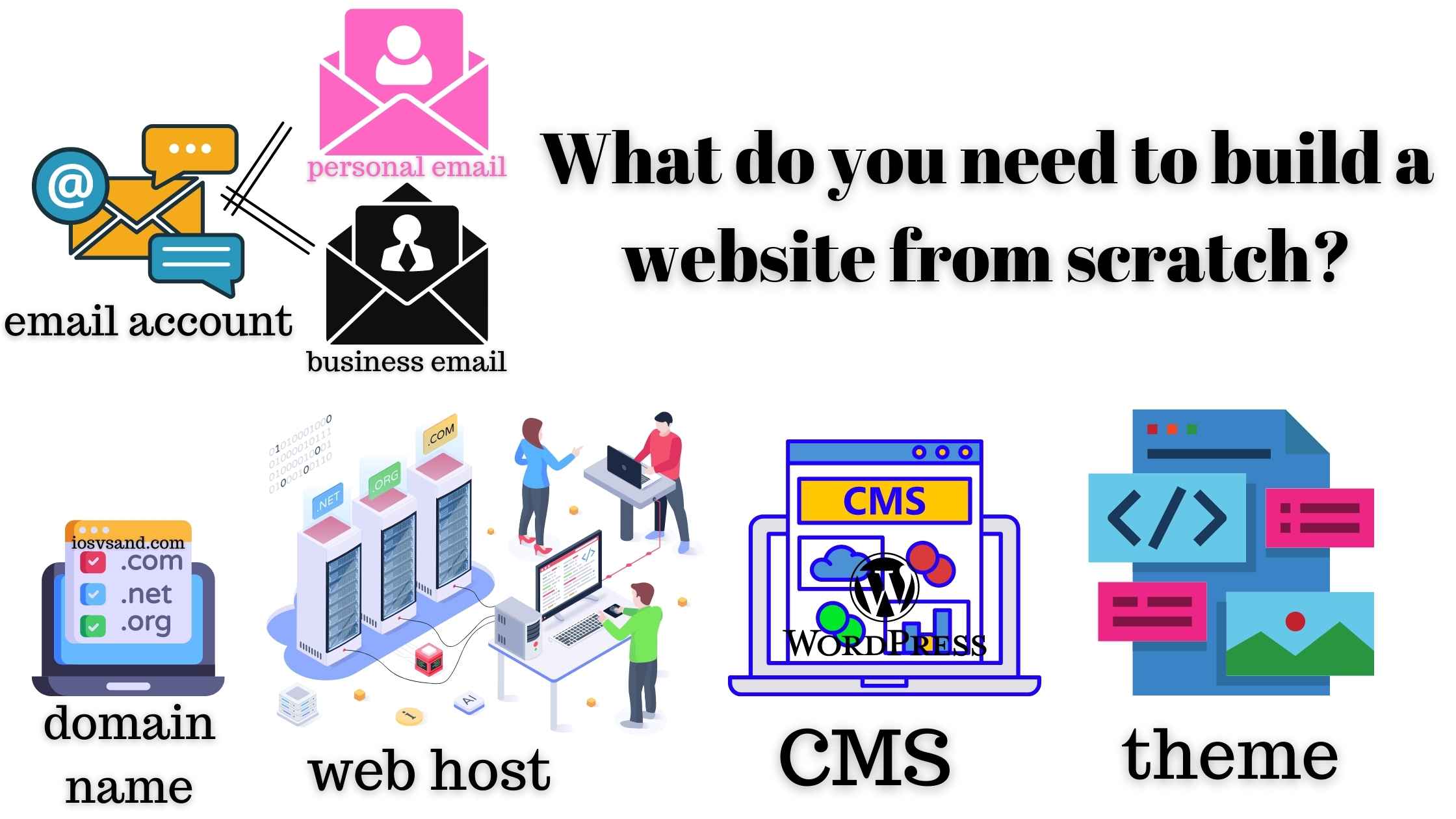
An email account-
Blogging is a great way to share your thoughts, ideas, and experiences with the world. But to blog, you first need to set up a blog site. This typically involves registering for a web host and entering your login credentials for the WordPress admin area. But you can’t do any of that without an email account.
That’s because most web hosts require you to create an account using your email address. And to enter your WordPress login credentials, you’ll need to know your email address and password. Plus, email is the best way to stay in touch with your blog followers and keep them updated on new posts.
An email account is essential for bloggers to keep in touch with their readers. Bloggers can use email to send out newsletters, announce changes or new posts, and even ask for feedback. Email provides a quick and easy way for bloggers to stay connected with their readers.
There are many good reasons to keep your personal and business email separate. For one, it can help you maintain secrecy about your business dealings. Additionally, it can make it easier to track which emails have been sent and received and who has access to which messages. Finally, using separate email addresses can protect you from potential lawsuits if something happens to your personal email account. Additionally, using different email addresses helps to avoid potential misunderstandings or data breaches if one of your email addresses is compromised. Click here to know more about email marketing.
So if you’re ready to start blogging, set up an email account first. It’s the essential first step in a blogging startup.
A domain name-
Domain names are the addresses of websites. They are unique and identify a particular website on the internet. They can be used for both personal and commercial websites. They can also be used for blogs, shops, and other online businesses.
Domain names are important for bloggers because they provide a web address for your blog. This web address is what people use to find your blog online. It is also how you will refer to your blog when you talk about it with other people.
When choosing a domain name, it’s important to choose one that is easy to remember and relevant to your website or business. You should also ensure that the domain name is available to register. You can check availability at websites like Sedo or Hostgator.
Once you’ve registered your domain name, you’ll need to set up hosting and configure your website settings. This can be done with a web hosting provider like iPage, Namecheap, Bluehost, or HostGator. You can also use Sedo or Flippa for this. Once your website is set up, you can start publishing content and building your online presence! Click to know more about the domain name.
A web host-
When most people think about creating a website, the first thing that comes to mind is designing the website. This is an important part of the process, but it is not the only one. You also need to find a web host. But what is a web host, and what does it do?
A web host is a company that provides space on its servers for websites to be hosted. In other words, it’s a company that owns and operates servers used to store websites. When buying a domain name, you must find a web host to store your website.
The server is a computer that is always on and connected to the internet; when someone types in the website address, the web host’s server sends the requested website to their computer.
Web hosts are also responsible for maintaining the websites they host. This includes ensuring the website files are backed up, keeping the server running smoothly, and updating software as needed.
There are many types of web hosts, including shared hosts, VPS hosts, and dedicated hosts. Shared hosts are the cheapest type of host and are perfect for small websites. VPS hosts are more expensive than shared hosts but offer more features and flexibility.
Some web hosting service providers are iPage, Namecheap, Bluehost, Hostgator, Cloudways, Interserver Hostinger, etc.
Some web hosts also provide domain registration, email, and WordPress hosting services. Click here to know more about web hosting.
A Content Management System (CMS)-
A content management system (CMS) is a computer program that allows publishing, editing, modifying content, and managing the website’s overall structure. A CMS facilitates creating and managing websites and web pages by allowing users to create and edit text, add images, and create and manage website navigation. The most popular CMSs are WordPress, Joomla!, and Drupal.
Why WordPress is the best Content Management System (CMS)
WordPress is a popular content management system that bloggers use to create and manage their blogs. WordPress is free and open-source software released under GPL. It is based on PHP and MySQL. WordPress is the most popular content management system in the world. More than 60 million websites are powered by WordPress, including some of the biggest names on the web, such as The Guardian, Forbes, and The New York Times.
One of the reasons for WordPress’s popularity is its blogging functionality. WordPress lets you easily write articles, add images and videos, and create menus. You can also easily share your articles with others through social media or email.
Another reason for WordPress’s popularity is its flexibility. With WordPress, you can create any type of website you want — a simple blog, a business website, or even a full-fledged eCommerce store.
A theme-
A WordPress theme is a collection of files that work together to produce a graphical interface with a specific layout for a website. A theme can be used to change the look of a website, add new features and functionality, or make it easier for users to navigate.
WordPress theme developers or designers create WordPress themes. There are thousands of free and paid themes available for WordPress users. Most themes are freely downloadable, but some premium themes are sold through various online marketplaces.
When choosing a WordPress theme, it’s important to consider the purpose of the website and the target audience. Themes should be easy to use and customizable, so they can be tailored to meet the needs of each user. Click here to know more about WordPress themes.
How to start a blog in WordPress
Below are the steps to start a blog from scratch with No Experience.
- Choose a domain name.
- Choose a host- Cloudways(coupon code SPEED10), Namecheap, iPage, Interserver, Hostinger, HostGator, or Bluehost.
- Install WordPress- All these hosts provide easy one-click WordPress installation.
- Set up your blog- Tweak your WordPress settings according to your need.
- Choose a theme- Click here to read the WordPress theme guide.
- Customize your blog.
- Install some necessary plugins, e.g., an SEO plugin, a Security plugin, an Optimization plugin, etc.
- Start blogging.
How to set up your WordPress blog at cloudways web hosting-
How to install wordpress-
How to connect domain name-
Read cloudways hosting review here.
How many types of blogging are there?
Blogging is one of the most popular and effective ways to share your thoughts with the world. There are many different types of blogging, and each has its benefits. Here are four of the most common blogging types:
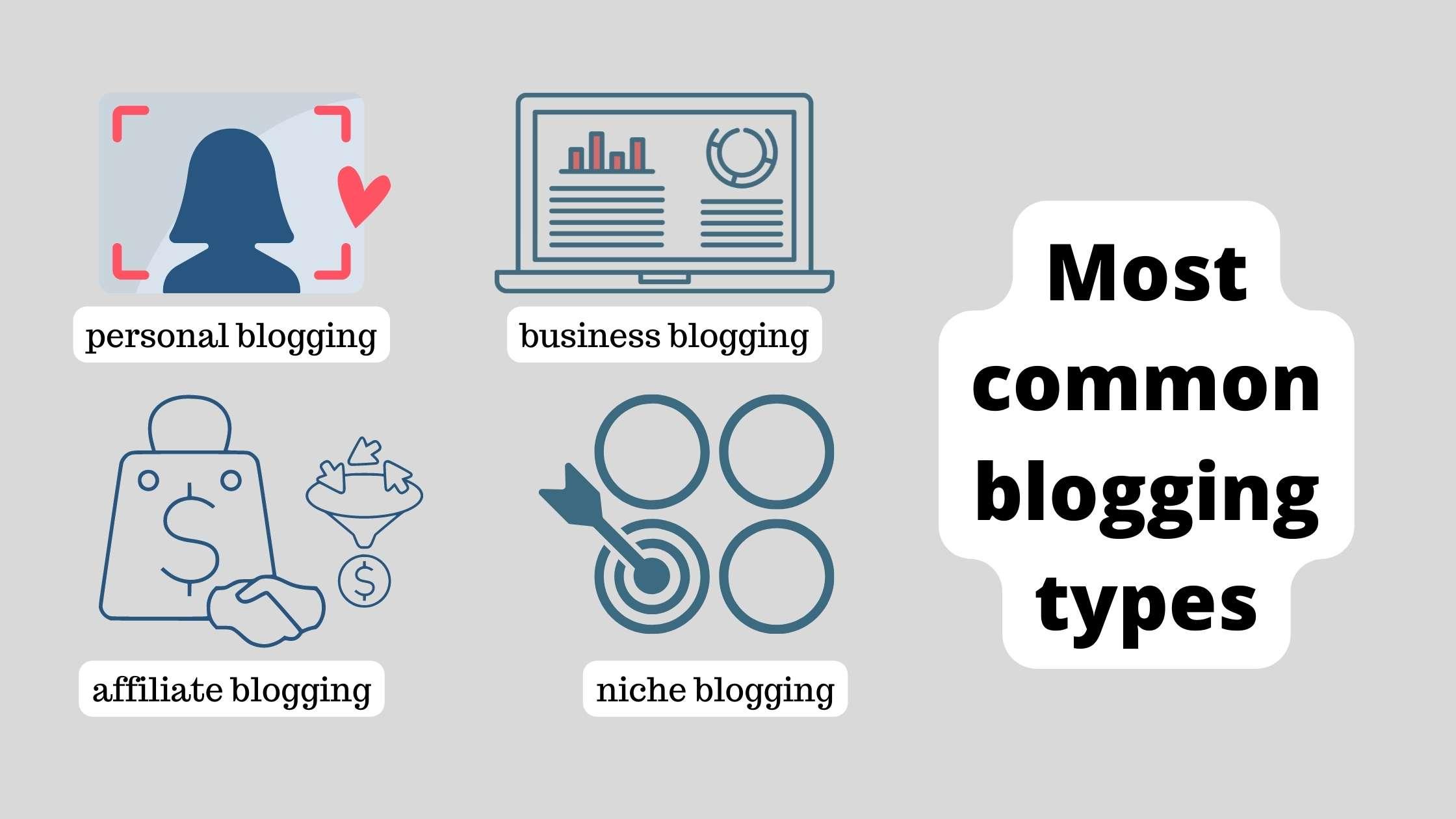
Personal blogging-
This is the type of blogging you do if you want to share your thoughts, ideas, experiences, and stories with the world. You can use this type of blog to express your opinions, connect with others, and build a following.
A blog is a personal website where you can post articles, pictures, and other content. You can use a blog to record your thoughts and experiences or share information about your hobbies or interests. Blogging can also be a great way to promote your business or connect with others who share your interests.
Business blogging-
Blogging has become a meaningful way to communicate with customers and promote businesses. Though it started as a personal communication tool, businesses quickly recognized the power of blogging to reach new markets, connect with customers, and promote products and services.
A business blog is a great way to share your company’s story, connect with customers, and promote your products and services. A blog is a great way to show off your expertise and build relationships with potential and current customers.
When done correctly, blogging can help you attract new customers, increase traffic to your website, and boost your bottom line.
Businesses can use blogs to communicate with customers and clients, share news about the company, provide helpful tips and advice related to the business, and build relationships with customers and clients.
Blogging is a great way to promote your business. It can help you to reach new customers and keep in touch with current ones. You can use a blog to share information about your products or services or to offer advice or tips. Blogging can also help you to build relationships with customers and partners.
In short, blogging for businesses is very beneficial.
Niche blogging-
Regarding blogging, there are two main types: general and niche. A general blog covers a wide range of topics, while a niche blog focuses on a specific hobby, topic, or interest. This can be a great option if you’re interested in blogging about something specific, like travel, food, fashion, or pets.
There are many different types of niche blogs, These can be a great way to learn more about a specific topic or hobby, and they can also be a great way to connect with others who share your same interests. Some examples of niche blogs include travel blogs, food blogs, fashion blogs, pet blogs, health and fitness blogs, gardening blogs, etc.
Niche blogging can be a great way to target a specific audience and build an audience around your blog. When you focus on a particular topic, you can become an expert in that area and provide valuable information and insights for your readers. You can also create content that is more relevant and interesting to them.
When starting a niche blog, it’s important to think carefully about the topic you want to focus on. Make sure there is enough interest in the topic to sustain a blog and that you have something unique to offer your readers. Try to select a profitable niche.
Affiliate Blogging-
It is a type of blogging where the blogger promotes other people’s products or services in exchange for a commission on any sales generated from the blog.
Affiliate bloggers typically review products or services they have used and then provide a link to the product or service on their blog. If someone clicks on the link and buys the product, the affiliate blogger earns a commission from the sale.
Affiliate blogging can be a great way to make money online and promote products and services that you believe in.
What are some advantages and disadvantages of blogging?
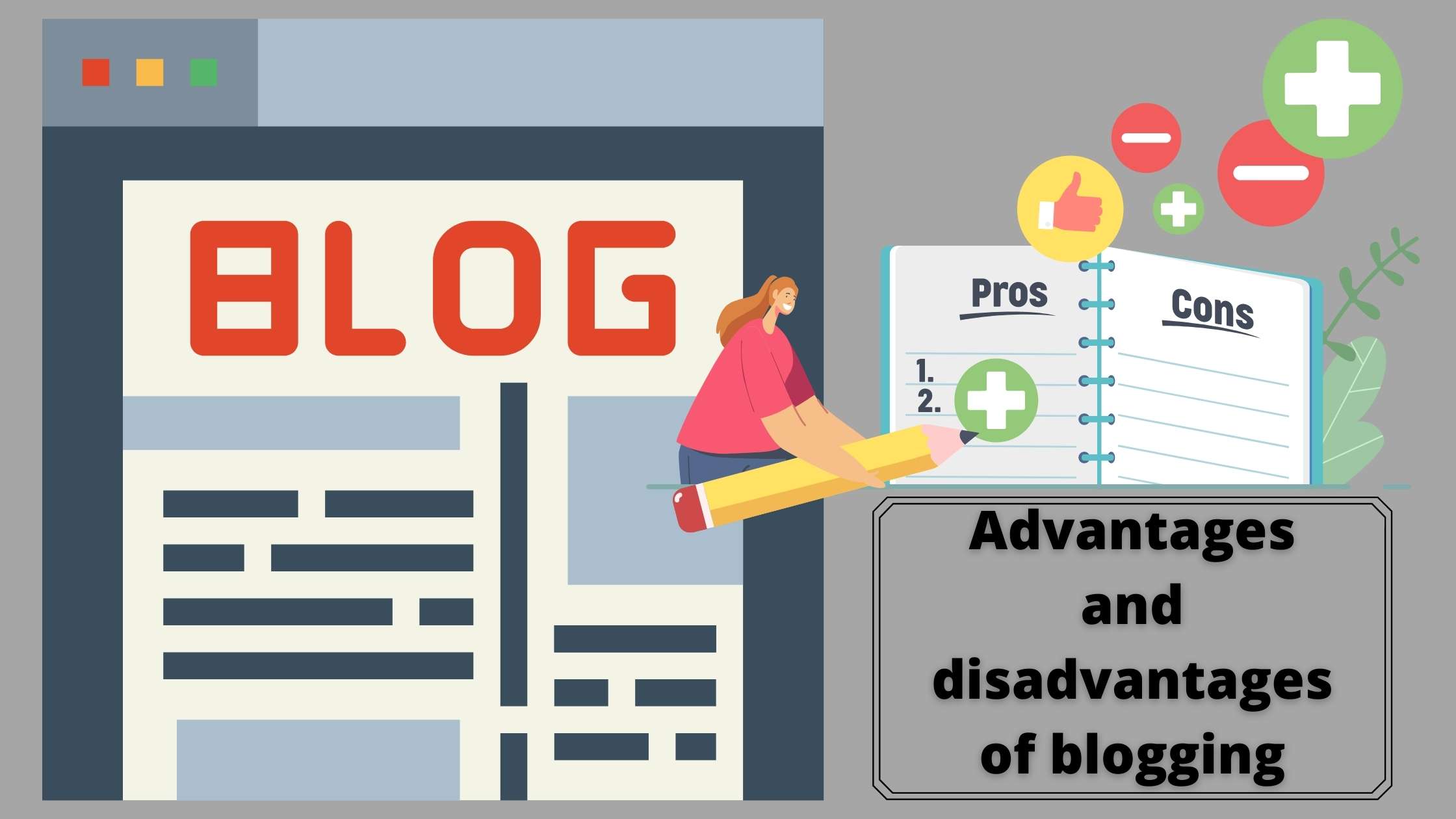
What are the benefits of blogging?
Blogging has many benefits for businesses and individuals.
Personal level
Blogging is a great way to organize your thoughts and get your ideas out there for others to read. Not only can it help you to share your thoughts, but it can also give you a platform to voice your opinions and connect with other people who share similar interests. By keeping a blog, you can stay up-to-date on the latest news and trends and connect with like-minded individuals.
Starting a blog has been found to increase creativity, productivity, and overall awareness. Research has shown that blogging people are more creative and productive than those who don’t. Additionally, blogs offer an outlet for expressing emotions that may not be expressed in other forms of communication.
Blogging has become a popular way for people to share their thoughts and express themselves. It can increase knowledge and understanding of oneself and communicate with others. Benefits include improved self-expression, increased knowledge, and a closer connection with others.
Blogging has been shown to increase self-awareness and self-confidence. Bloggers who blog regularly tend to be more aware of their thoughts, feelings, and actions and are more confident in themselves. They also feel better about themselves because they can share their thoughts with others.
Blogging can be a great way to organize your time and manage your work. Keeping a blog can track your progress, share your ideas and successes with others, and get feedback. Additionally, blogging can help you stay on top of new developments in your field and find new opportunities.
Blogging is an effective way to improve writing skills and communication skills. When writing a blog post, the blogger is forced to be concise and clear. Blogging also helps to improve grammar and spelling. In addition, blogging helps to build relationships with other bloggers and readers. This can lead to improved communication skills, both online and offline.
Business level
Blogging is a great way to help boost your online presence and establish yourself as an expert in your field. Not only will you build a loyal following of followers, but you’ll also be able to share your thoughts and ideas with a broader audience. By blogging, you’ll not only increase your online visibility, but you’ll also develop relationships with potential clients and allies.
Blogging can help establish credibility as an expert in a particular field. Creating a blog allows you to share your thoughts and experiences with others, and it also allows you to promote your work. You can demonstrate your expertise to potential clients or customers by writing about relevant topics to your field. Also, blogging can help you build relationships with other professionals in your field, resulting in collaborations or business opportunities.
Another great benefit of blogging is that it helps businesses to connect with new customers. By sharing relevant information and providing valuable insights into their industry or niche, business owners can attract new readers who may be interested in what they have to offer.
Blogging is a great way to increase brand awareness and exposure and grow your business. By blogging, you can reach a larger audience with your blog and connect with potential customers. Additionally, blogging can help you improve your Search Engine Rankings and grow your website traffic.
Blogging can be an effective way to improve lead generation and sales. By blogging, businesses can share their knowledge and expertise with potential customers, helping them to learn about the company and its products or services. Also, blogging can help businesses connect with customers and create loyalty among followers. Also, blogging can lead to increased web traffic and sales.
Blogging provides an opportunity for you to get feedback from customers. You can learn what customers want and need from your business by publishing blog posts and asking for feedback. This feedback can help you change your products or services to meet customer needs better.
Blogging also helps you communicate with customers more effectively. By posting regular blog updates and responding to their comments, you can keep customers informed about what’s going on with your company. This can help build trust and encourage customers to do business with you. Additionally, blogging can be used as a tool for customer service.
Blogging can increase customer loyalty. Customers are more likely to stay loyal to your brand when they are given a voice and feel like they are part of the process. In addition, blogging can help you build a better relationship with your customers. You can share new products or services through your blog, announce promotions, and provide insights into your company culture. This helps customers feel more engaged with your business and encourages them to return to your blog for updates.
What are the disadvantages of blogging?
One of the main disadvantages of blogging is that it can be a lot of work. Not only do you have to write original content, but you also have to ensure that your blog is well-maintained and updated regularly. This can take up a lot of time, especially if you’re not used to blogging regularly.
Another disadvantage of blogging is that it can be time-consuming. If you want your blog to be successful, you need to invest time into promoting it and attracting readers. This can take up much of your time, especially if you’re also working on other projects. It takes time to develop ideas for posts, write them, edit them, and publish them. And if you want to be successful, you need to post regularly (at least once a week).
Blogging can be competitive. People often compete for attention and traffic, which can be challenging to get in large numbers. Competition is fierce. There are millions of blogs, and it can be hard to stand out in such a saturated market.
It can be very stressful. It’s not uncommon for bloggers to constantly feel like they need to produce new content to keep their readers engaged. This can lead to a lot of pressure, and sometimes bloggers will write about things they don’t really care about so that they have something new to share.
Blogging can also be discouraging. It’s easy to feel like you’re not doing enough or that your blog isn’t popular enough if you don’t get a lot of views or comments. This can lead to many self-doubts and make blogging feel unfulfilling.
Blogging can be confusing. There are a lot of different platforms out there, and it can be hard to figure out which one is right for you. It can be confusing because it is an ever-changing field. Blogging software and platforms are constantly being updated, making it difficult to keep up. Additionally, many different blogging platforms are available, each with its unique set of features. This can make it hard to decide which platform is right for you.
Also, it can be confusing because it is used for various purposes. Some people use blogs to document their lives, others to share ideas and thoughts, and others to build businesses. It’s important to remember what your goal is when blogging so that you can make the most of this tool.
Blogging can be expensive. You need a computer, internet connection, and various tools or software to create your blog. You need to pay for a web hosting service and a domain name, and you may also want to invest in other tools and services (such as themes or plugins) that can help you improve your blog’s appearance and functionality. In addition, you may need to pay for promotional services to help notice your blog. This can add up quickly, especially if you are not generating income from your blog.
Blogging requires technical expertise and skills. You need to know how to use a web hosting service, set up a domain name, create and format posts, add images and links, and more.
Blogs can be a target for online attacks, such as spam or malware; bloggers may find that their blog posts are the target of online attacks such as spam or malware. These attacks can create problems for both the blogger and their readers. For example, a blog post spammed with links to dubious websites can be very distracting and annoying for readers. In addition, malware can infect a computer when someone visits a website infected with it. This can lead to personal and financial information being stolen or even identity theft.
Blogs are also often used to spread rumors or personal information, leading to online bullying.
Finally, blogging can be risky. You may inadvertently share personal information or confidential information online without realizing it, which can put them at risk for identity theft. You may anger someone by posting something critical about them online. And Additionally, if you are not careful with your words, you could get in trouble with your boss or the law.
You don’t know who is reading your blog and what they might do with the information.
Cyberbullies or stalkers can target bloggers. Bloggers can also be sued for libel or slander if they write something untrue about someone. Blogging can also hurt your job prospects if potential employers find your blog and disagree with what you’ve said.
What are the top mistakes bloggers make? And How to make your blog stand out?
Bloggers make a lot of mistakes when it comes to creating a successful blog. By avoiding these top common mistakes, you can make sure that your blog stands out from the rest. These are the Dos and Don’ts of Blogging-
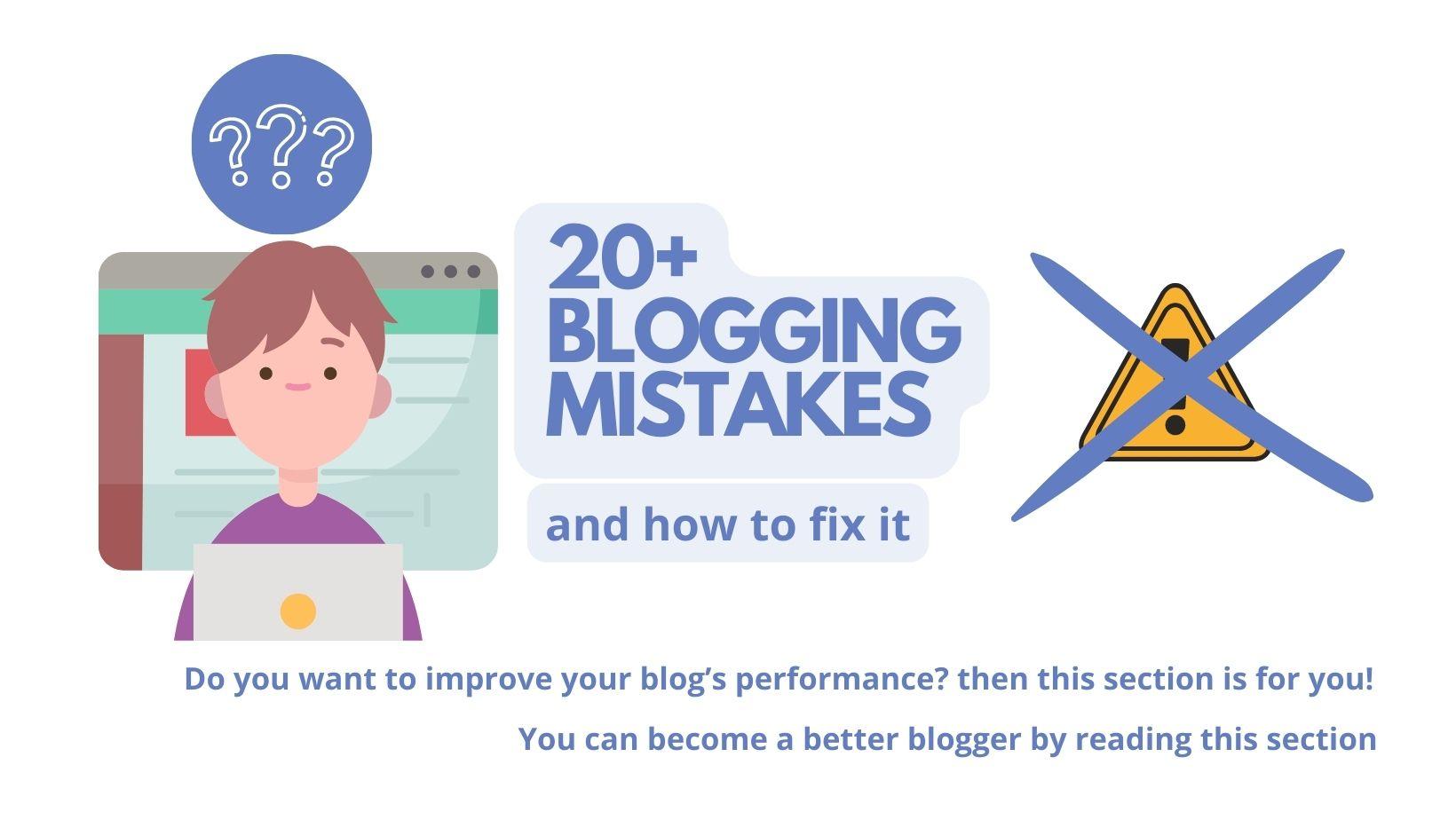
Not Doing Enough Research on Your Topic:
Bloggers should spend time doing primary research before they even start writing to ensure their information is accurate and up-to-date. If they don’t do this, their readers may get misinformation or outdated information. If you don’t have a good understanding of your topic, it’s going to be hard to write about it effectively.
Not thinking about their audience:
It’s important to think about your audience when you’re writing your posts to target your content specifically toward them. To be successful, bloggers need to put themselves in their readers’ shoes and figure out what they want to see.
Not creating interesting and engaging content:
To be successful, you need to keep your readers engaged with interesting and unique content. You also need to diversify your content to appeal to a wide range of people. If you can do these things, you’ll be on your way to blogging success.
Not Engaging with Readers:
Keep up with comments and questions. It’s easy to lose track of the conversations on your blog. Commenting and replying is a great way to keep your audience engaged. It doesn’t just allow you to interact with your readers, it also provides them with a chance to talk back. Make it easy for your readers to connect with you. If you have a Facebook or Twitter account, make sure the links are easy to find.
Lack of Planning:
Make a plan. Outline what you want to achieve with your blog, and then stick to it. This will help you stay on track and avoid getting sidetracked and losing sight of your goals.
Not planning ahead- Planning your posts will save you time, help you stay on track, and maintain a consistent message across your blog.
Focusing on Quantity Over Quality:
This can lead to poorly written articles that are difficult to read and understand. This can lead to lower engagement and a decrease in readership. To produce high-quality content, bloggers should focus on writing well-researched and informative pieces.
Not proofreading their posts:
Bloggers make a lot of mistakes when it comes to grammar and spelling. Proofreading their posts is critical, but many bloggers neglect this step. Poor grammar and spelling can quickly turn a great post into a poor one.
Not formatting their posts correctly:
Not only do they fail to properly format their text, Not only do they often use the wrong font size or color, but they also often don’t use bold or italics correctly, which can make their content difficult to read. Additionally, bloggers often leave out important elements, like headings and lists, which can seriously damage their writing. If you want to ensure your content is easy to read and organize, format it correctly. If you want your blog to be effective and productive, ensure a clear and concise article structure. This will ensure that your content can be easily read and organized and provide a better user experience for your readers.
Poor website Design, not mobile-friendly:
Poor design is one of the bloggers’ top mistakes when creating their websites or blog. A poorly designed website can be frustrating and difficult to use, leading to fewer visitors and a lower search engine ranking.
Designing for desktop and mobile devices is essential for bloggers who want to keep their readers happy and engaged. Incorporating responsiveness into your web design will ensure that your content is easily accessible on all devices, maximizing your reach.
Not using images, videos, or other multimedia:
Bloggers often forget that including multimedia content can help engage readers and increase engagement. Not using multimedia can easily make your posts look boring and less professional. Images, videos, and other multimedia can capture readers’ attention, boost website traffic and help promote your content. When used correctly, multimedia can be a powerful tool for bloggers. However, making sure that multimedia is used effectively is key to success.
Not using social media to promote their content:
When sharing their content online, many bloggers mistake not using social media platforms like Facebook and Twitter. Social media can also help you build relationships with other bloggers and potential customers. In addition, they may not promote their content enough, leading to less visibility and engagement with their readers. By using social media and promoting their content regularly, bloggers can ensure that their audience stays informed and engaged with their work.
Not tracking and monitoring:
Bloggers often mistake not tracking their results to see what works and what doesn’t. Not monitoring stats and analytics can make it difficult to determine what content resonates with readers and which pieces may need more refinement or adjustment. By tracking results, bloggers can identify which topics are most popular and make sure to cover those topics more frequently in future writing.
Not using good SEO practices:
You are not using proper keywords, titles, and descriptions. Also, not using keywords in the right places, not optimizing images, and not creating a content strategy can hinder a blog’s ranking in search engines. This can lead to lost traffic and potential customers. Proper SEO techniques can help your blog stand out from the competition, improve your website’s ranking, and boost your website’s visibility. Click here to know more about SEO best practices.
Not Building an Email List:
For most online entrepreneurs, the holy grail is building an email list. Unfortunately, many bloggers neglect to create a subscriber base and instead depend on search engine traffic to drive their income. Without a subscriber base, generating revenue from your blog is difficult. Building an email list and cultivating an audience will ensure that your content is valuable and relevant to your readers. Remember that you’re not just building an email list for your blog. You’ll also want to consider selling products and services through the blog. This is a great way to increase your income and make more money from your blog.
Not monetizing their blog:
This can be a mistake because not monetizing your blog means you’re not getting any income from it. If you want to make money from your blog, you need to consider ways to do so. Not monetizing can mean not doing things like selling advertising, signing up for affiliate programs, charging for access to their content, etc. This can lead to a decline in traffic and eventually a loss of readership.
Not using keywords in the contents:
Using keywords in your posts can help improve your SEO and attract more readers. Not using keywords can make finding your blog difficult when people search for related content. Using relevant keywords in your posts can improve your blog’s visibility and chances of being discovered by potential readers.
Not Keeping up to Date:
Bloggers who don’t keep up to date with the latest trends and techniques may miss out on opportunities to improve their blogs and attract more readers. Not being current means not having the latest information and insights, which can result in losing readers. Here are some tips on how to do just that.
Join online communities and discussion boards related to your topic. This way, you can stay up-to-date on your topic’s latest news and events. When you join online communities and discussion boards related to your topic, you also have the opportunity to ask questions and get answers from others. This is an excellent way for bloggers to keep up with trends. Read blogs related to your topic. Check out online sites that cover your topic. Many online sites focus on a particular topic. Take a few minutes to check out the latest articles for your interest.
Not posting regularly:
Bloggers who don’t post regularly tend to lose readers and followers. Readers will become frustrated if they don’t see new content, and followers will wonder why the blogger isn’t promoting their work more. Regular posting keeps your blog top of mind for potential readers and strengthens your relationship with them. A regularly updated website is a must for growth.
Not networking with other bloggers:
Bloggers are always looking for ways to improve their blogs and reach a wider audience. One way to do that is by networking with other bloggers. However, many bloggers make the mistake of not doing this. Not only is this a missed opportunity to learn from others, but it also limits the reach of your blog. By networking with other bloggers, you can increase your exposure, attract new readers, and build relationships that can help you achieve your blogging goals.
Not doing internal linking:
Internal linking is one of the most important aspects of blogging. Internal linking is when you link to your posts from other posts on your site. It helps readers find related content and makes your blog more searchable. Not doing internal linking can hurt your blog’s traffic and rankings.
Not doing guest posting:
Guest blogging is an essential part of any blogger’s arsenal. Not only does it allow you to share your content with a broader audience, but it can also help you build relationships with other bloggers and influencers.
Unrealistic Expectations:
Bloggers often mistake setting unrealistic expectations for their readership, leading to frustration and disappointment. Based on what you may have seen other bloggers doing, it can be easy to fall victim to unrealistic expectations when starting as a blogger. Set realistic goals for your blog, and be willing to adjust your writing style accordingly. When you set unrealistic expectations for yourself, it’s virtually impossible to achieve. No matter how hard you try, you’ll be disappointed whenever you don’t meet your lofty standard. Instead, set SMART goals that are achievable and measurable.
How do you motivate yourself for blogging when you are feeling demotivated?
Keeping your blogging motivation up can be tough, especially when you’re not seeing any real gains from your work. But you can do a few things to help yourself stay motivated and on track.
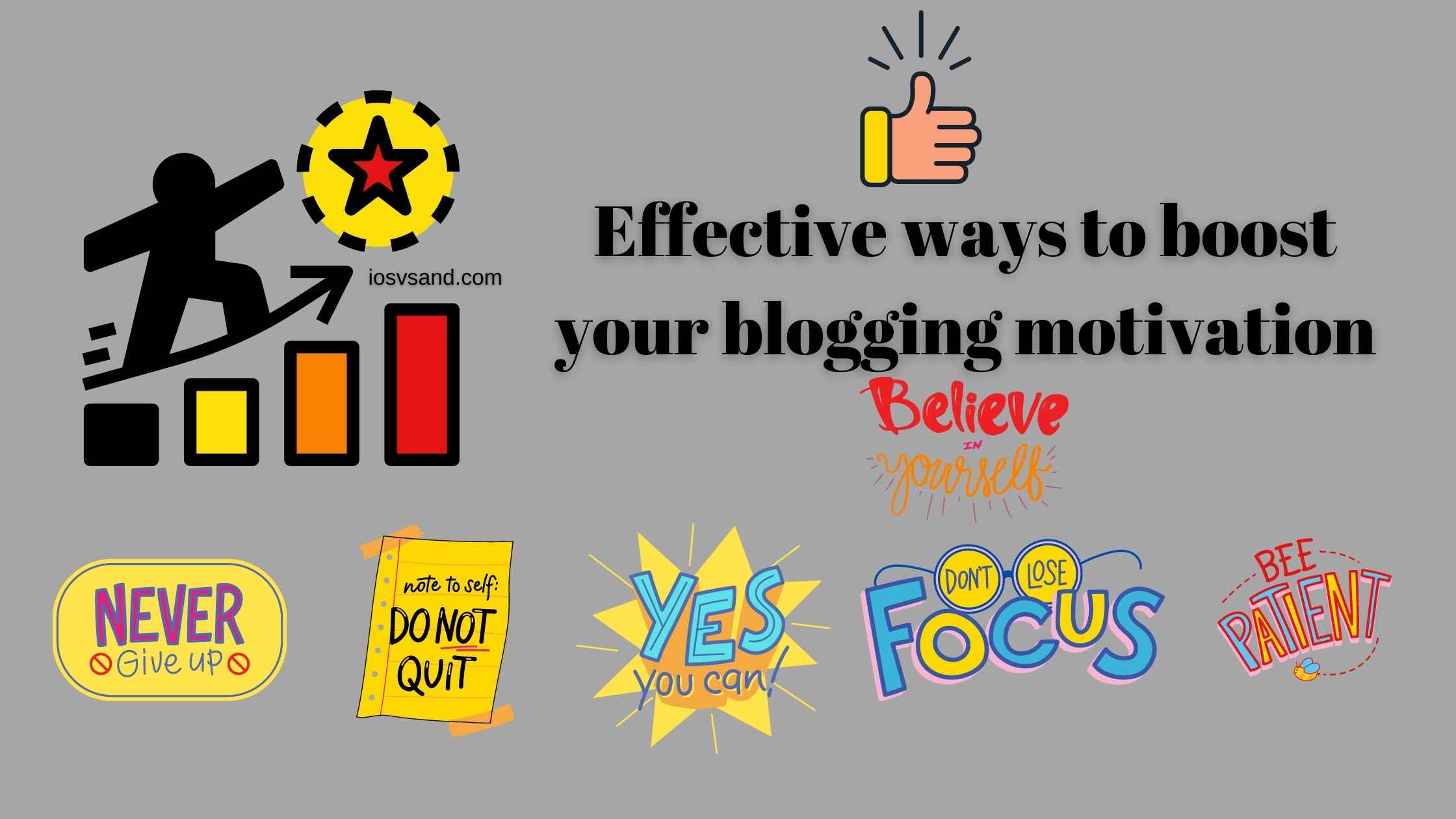
Set realistic goals for yourself. It’s important to remember that blogging is a long-term project, not a short-term fix. And don’t get discouraged if you don’t see immediate results. Take things slow and make gradual progress over time. Don’t push yourself to write articles every day or produce new content constantly. Instead, set reasonable goals that you can eventually reach.
Reward yourself. Take time to do something you enjoy after posting a blog article or creating new content. This will help keep you motivated and interested in writing.
Keep a writing journal. Writing down your thoughts and ideas helps keep you focused and on track. It also gives you a tangible way to revisit your work and see how it’s evolving.
Write when you have time. Don’t write your posts at the last minute. Create a set schedule for posting and stick to it.
Avoid the temptation to lapse in your blog posts. This will make it harder to keep writing once you start.
Identify what keeps you distracted from writing. Are you avoiding writing because you feel overwhelmed? Do you worry that your blog is not good enough? What do you need to get out of your head before you can write?
Take a break from writing for a few days. This is a great way to let your mind wander and get back into writing mode. You can do this by taking a vacation or switching it off for a day or two.
Get out of your comfort zone and write something completely different. You can write about anything and everything. Even if you don’t like what you wrote, it’s a good way to get back into the writing mood.
Build a support system. Having your friends and family support you is the best way to keep going when you feel overwhelmed. Having someone to talk to can bring you out of your funk and give you confidence in what you’re doing.
Pay attention to other bloggers who inspire you– Motivation can be tough when you don’t feel like blogging. But looking at other bloggers and what they can help you get back into the swing of things. For example, look at how some of your favorite bloggers focus on their content and audience. They are passionate about their topic, which shines through in their writing. Keep this in mind as you write your blog posts, and you will likely stay motivated.
Can I do blogging for free, or does it cost money to start a blog?
Many people think they must pay to start their blog in today’s blog world. But is this true? Can you start a blog for free? Yes, you can! There are many ways to do it; your best way will depend on your skills and resources. Whether you have a blog that you want to share with the world or want to test the water before making any investment, there are many ways to get started for free. It all depends on what you’re looking for and how much time you want to spend on the project.
There are many free blogging platforms available online. However, not all of them are effective or reliable. Before choosing a platform, research it thoroughly and test it to see if it meets your needs.
List of free blogging sites that you can use to create your blog for free-
WordPress (wordpress.com)
These are some of the best blogging platforms which you can use for free blogging.
Disadvantages of free blogging platforms-
There are several disadvantages to using free blog sites-
- Limited design options
- Limited customization options
- Limited features
- Less control over website features and functionality
- Ads can be intrusive
- Limited storage space
- Limited formatting options
- Limited bandwidth
- You can’t use the SEO plugin
- You can’t use Google Analytics and Google search console
- It may not be professional-looking
- Not all sites are reputable
- Limited audience reach
- Limited ability to track reader analytics
- You don’t own your content
- You don’t own your blog
- Your blog might not be indexed by search engines or potentially lower search engine rankings.
- Potentially less traffic
- Potentially less credibility with readers
- Limited support options
- It can be hard to make money from your blog
- Limited ability to monetize the blog
- Security risks
- Your blog can be deleted without warning
How to Create a Content Strategy
Creating a content strategy for your website is essential to ensuring your site remains successful. Creating a content strategy can be daunting, but it’s essential for any business looking to increase its online presence. By following these six tips, you can develop a plan that will help your website or blog stay top of mind and attract new visitors.
- Define your target audience.
- Identify the topics that are most relevant to your audience.
- Identify your competitors and analyze their Content Strategies.
- Choose the proper content formats to reach your target audience.
- Measure the success of your content strategy.
- Continuously update and improve your content strategy as needed.
Tips for creating your first blog post
There are countless blogging ideas- from starting a personal blog to writing about your favorite topic- and plenty of ways to get started.
- Write about something you’re passionate about
- Do your research
- Use keywords and SEO techniques
- Start with an outline
- Use a catchy headline
- Write an introduction that hooks your reader. Give your readers a reason to keep reading. Reader engagement is very important.
- Share your expert knowledge or personal experiences
- Be concise and to-the-point
- Make it easy to read
- Use images and videos to break up your text, and you can use online graphic design tools to create attention-grabbing visuals.
- Use helpful tools like lists and infographics.
- Summarize your post and leave a solid call to action
- Edit and proofread
- Engage your readers by asking them questions
- Engage your readers by asking for feedback and comments
- Use social media to share your posts
- Promote, promote, promote!
- Keep writing and improving over time
- you can use an ai writer for help
- you can also use TTS software to make an audio version of blogging
- you can use any presentation software or video animation software to create some presentations and videos and add them to your blog post.
How to Get More Traffic to Your Blog
Tips for bloggers to get more traffic-
- Publish quality content regularly (use editorial calendar)
- Share your blog posts on social media platform like Facebook, Twitter, Quora, Pinterest, youtube, Instagram, etc.
- Submit your sites on various search engines like google, bing, Yandex, Baidu, etc.
- Participate in Forums, Online Communities, and Q&A Sites
- Speed up your website
- Optimize your blog posts for search engines, follow SEO best practices
- Use keywords in your blog posts
- Write Eye-Catching Titles and meta descriptions
- Reach out to other bloggers and collaborate with them
- Attend Conferences and Events
- Write guest posts for other blogs
- Use Paid Advertising
- Use Email Marketing
How to make money by blogging
Can blogging make you money? Blogging can make you money if you do it right. People are turning to blogs as a new avenue for generating income. Blogging can be done for personal or professional gain, and there are many ways to monetize a blog. Some bloggers make money through advertisements (Google Adsense, etc.) and affiliate marketing, while others receive donations from readers and some via selling online courses. Whatever the case, there are numerous ways to make money blogging. Click here to learn more about How to monetize your blog and make money blogging.
FAQ about blogging
How much does it cost to start a blog?
For most people, starting a blog is a relatively easy and affordable proposition. Many low-cost blogging platforms are available. Check our mystery deals page to get secure and cheap hosting services. Most bloggers don’t need to spend more than $10 per month to get started. You just need to buy a domain and hosting service to get started.
How can a beginner start blogging?
If you’ve never blogged before, you can read this noob-friendly blogging guide, and there are a few things you need to know to get started. First, choose a topic/niche that interests you. Second, research the best blogging tools and techniques. Third, build an outline of what you want to write about. Finally, start writing!
Which blogging platform is best for writers?
WordPress is the best and most popular open-source platform for bloggers and content creators. It’s easy to use, free, and has many features to help writers create blog posts, articles, and more. WordPress is the best blogging platform for writers, including its wide range of features, flexibility, and ease of use. Also, it has a wide range of plugins and themes to customize the look and feel of the blog; the ability to share posts via social media easily; and a robust commenting system that enables users to engage with other bloggers. Blogging with WordPress is a great idea.
What is a blog, and how does it work?
A blog is a website where people can post their opinions, thoughts, and experiences. Most of them post content regularly. This content can be in the form of text, photos, videos, or audio. Blogs are usually personal in nature and are often used to share opinions or personal experiences. It can also share information about products or services for business purposes.
It is a web page that consists of periodic, reverse-chronological entries called posts. A typical blog combines text, images, and links to other blogs, Web pages, and other media related to its topic. Most are primarily textual, although some focus on art (art blog), photographs (photoblog), videos (vlog), music (MP3 blog), audio (podcasting), or a combination of these.
Blogs usually have a comment section where readers can leave feedback. Blogging has become a popular way to share information and connect with others with similar interests.
Can anyone write a blog?
Anyone can write a blog. All you need is a computer, an internet connection, and the writing ability to put thoughts into words. There are no rules to blogging, so you can write about anything that interests you. You don’t even have to be an expert on the topic; you can simply share your thoughts on the matter. Your blog could be about your favorite food, TV show, or anything else that interests you.
How you can start a Blog?
Blogging is a great way to share your thoughts with the world and can also be a great way to make money. If you’re new to blogging or want to start blogging but don’t know how here are some tips for How to be a blogger.
First, learn from other bloggers. Read blogs about blogging, watch videos on YouTube about blogging, and take courses on how to blog. This will give you a basic understanding of what blogging is and how it works.
Second, start by creating a blog on a free platform like WordPress or Blogger. These platforms are free to use, and they make it easy to create a blog and start publishing content.
Third, write quality content that people will want to read. Your content should be interesting, informative, and relevant to your audience.
Fourth, When you start seeing results from your online marketing efforts, it’s time to move on to paid platforms.
How to start a blog free?
There are many free blogging platforms available online these days. If you want to start a blog but don’t have any money to spare, don’t worry! There are a few ways to start a blog for free. You can use free blogging platforms like Blogger, WordPress, or site123. This is how to start a blog with no money.
How to start a blog free?
There are many free blogging platforms available online these days. If you want to start a blog but don’t have any money to spare, don’t worry! There are a few ways to start a blog for free. You can use free blogging platforms like Blogger, WordPress, or site123. This is how to start a blog with no money.
Is Blogging Still Profitable?
For years, people relied on traditional media to get their information. But with the advent of the internet and blogs, this has changed. Nowadays, people are more likely to get information from blogs than newspapers or television. So is blogging still profitable? The answer is yes – if you’re willing to put in the extra effort, it also depends on your blog and the niche you write in.
Companies are still investing in blogging as a digital marketing strategy. However, the industry is constantly changing, and new tools and platforms are emerging. Blogging can be profitable for those who can keep up with the ever-changing landscape.
What is the difference between Blogging vs Vlogging
Blogging is a form of writing that people use to share their thoughts and experiences on a personal website. Conversely, Vlogging is a type of video blogging where people make videos about their lives and share them online. They also have key differences that should be considered before deciding which format to pursue. Blogging is more text-focused, while vlogging is more camera-focused, but both have their own advantages and disadvantages.
What is the difference between a vlogger and a blogger?
Bloggers and vloggers are two different types of online content creators. Bloggers write about their personal experiences, thoughts, and insights on a particular topic, while vloggers create video blogs or short videos about specific topics. There are critical differences between the two types of content creators, which will be highlighted below.
Bloggers are typically more writing-focused, while vloggers are more video-focused. If you’re looking for a camera to vlog with, then a vlogging camera is the way to go.
Why blogging is important for business?
Blogging is important for businesses because it allows them to communicate with their customers and build relationships. It also allows you to share your company’s story, products, and services with your audience. It also allows businesses to track their online presence, measure their marketing efforts’ success, and find new ways to improve their operations. Additionally, by blogging, businesses can create a portfolio of work that can be used to attract new customers and investors.
How to Start a Blog in 7 Steps-
Choose a platform (e.g., WordPress)
Choose a domain name and hosting
Set up your blog
Write your first post
Start promoting your blog
Keep writing and growing your blog
Monetize your blog
Do bloggers make money?
There is no definitive answer to this question as it largely depends on the blog’s niche and content. However, most bloggers seem to make a modest income from advertising and sponsorship, as well as from selling e-books, selling SaaS, and other products. While the income potential is not necessarily high, there are many opportunities for bloggers to make a small amount of money every month.
Which blogging platform is best for making money?
WordPress is the best blogging platform for making money because of its widespread popularity, easy customization, and monetization options. With WordPress, you can easily create a custom blog or website and then sell advertising space or use affiliate programs to generate income from your website. WordPress allows you to easily create an eCommerce store, which can be a great way to make money through online sales. You can also sell digital products like ebooks, etc. WordPress is reliable and secure, making it an excellent choice for any blogger looking to make money online.
What are templates in blogging?
A template is simply a pre-made layout that you can use as a starting point to help you organize your thoughts and content. They allow you to create a set of boilerplate text or HTML, CSS, JavaScript, etc., that you can repeatedly use to write new posts without retyping or redoing. This can save you time and make your blog easier to manage. Many different types of templates are available, so find one that works best for your blog and start using it!
How to make a blogging successful?
To make blogging successful, start by setting realistic goals for yourself. Blogging is not a quick fix – it takes dedication and time to build an audience. Be sure to reward yourself for your hard work by taking time for yourself every now and then. Finally, be willing to experiment with your content and keep an open mind about what will work best for your blog. This is how to start a blog successfully.
How do I optimize my blog for search engines (SEO)?
Use the best SEO plugin and follow the SEO best practices.
Why do most bloggers fail?
Most bloggers fail because they don’t have a clear goal or strategy for their blog. They don’t have a plan for building an audience. They also don’t take the time to develop a loyal following. Finally, they don’t monetize their blog effectively. To avoid this, follow these steps: First, ensure a content strategy. Next, create compelling posts that are well-written and informative. Finally, be consistent with your blogging schedule and promote your content regularly.
Conclusion:
In conclusion, blogging can be a great way to share your thoughts and experiences with others and build a platform for promoting your work. However, it does take time and effort to create quality content that will attract readers. If you’re willing to put in the work, blogging can be an enriching experience, but it’s important to remember that blog posting is a commitment. If you can stick to a regular schedule and post quality content, your blog will become a valuable asset to your online presence. We Hope this definitive guide for blogging helps you to make a start.
